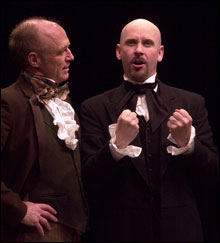 Oh, what a tangled web we weave when first we practice to be perfect. Molière’s The Misanthrope is recognized as his best-crafted take on such an obsession, Richard Wilbur’s marvelous verse translation is the best hands-down, and the current 2nd Story Theatre production (through May 7) is a heartfelt take on a comedy that doesn’t neglect to leave us laughing.
Oh, what a tangled web we weave when first we practice to be perfect. Molière’s The Misanthrope is recognized as his best-crafted take on such an obsession, Richard Wilbur’s marvelous verse translation is the best hands-down, and the current 2nd Story Theatre production (through May 7) is a heartfelt take on a comedy that doesn’t neglect to leave us laughing.
Molière liked to fashion plays around people who epitomize laughable traits — hypochondria, intellectual or pious pretension, avarice, and so on. As in Tartuffe, which dealt with religious hypocrisy, in The Misanthrope the central character is someone we basically agree with.
The attitude that Alceste (Ed Shea) takes to extremes is that people are social hypocrites, praising falsely or failing to criticize behavior just because they don’t want to offend people. “To be admired one most only exist; every lackey is on the honors list,” he complains. (Our era of grade inflation would have sent him howling.)
He’s not so much a misanthrope as, well — perhaps the play should have been titled The Guy Who Desperately Wants Everyone to Be Honest with One Another. But that would be too long in French.
The play starts out with Alceste furious at a good friend. The monstrous act Philinte (Walter Cotter) committed was to effusively welcome a person whose name he hardly remembered. “Once the man’s back is turned, you cease to love him/And speak with absolute indifference of him!” Philinte protests that he was only being polite, but that falls on deaf ears.
ADVERTISEMENT
 |
In a property lawsuit against him that is soon to be judged, Alceste refuses to defend himself, apart from declaring his virtue. You can imagine how that will turn out. An additional lawsuit, for slander, results after a pretentious fop, Oronte (Jim Sullivan), badgers him into critiquing a flowery sonnet he’d just written. “There’s no excuse for printing tedious rot/Unless one writes for bread, as you do not,” he is informed. Presumably, Alceste is not invited to many cocktail parties.
The antebellum setting of this production helps enormously to make Alceste’s outsized behavior seem somewhat less implausible. The genteel Old South, with its chivalry and code of honor, is a good parallel to the 17th-century French court. As is the practice at 2nd Story, the in-the-round stage is all but bare. There’s a chandelier above and an elegant carpet below, but filling in a set is left to our imaginations. Fortunately, that doesn’t extend to the costumes, and designer Ron Cesario has outdone himself. The elaborate hoop skirts are not only eye-poppingly beautiful, they characterize their occupants: a cascade of sleeve frills on the frivolous ingénue; reds and oranges for the angry, repressed spinster-in-waiting.
Alceste’s obsessive forthrightness is costly to him, we see in his relationship with the lively young Celimene (Lara Hakeem). He loves her madly, and she claims to love him. However, she is socially insincere in the extreme, encouraging the flattery of amorous suitors, praising even those she doesn’t like, to continue their attentions. Alceste is in anguish and enthralled. Hakeem plays Celimene delightfully, as a girl who just wants to have fun, and whenever Alceste exits, party music comes on as she solo dances like a disco queen. She is no bubblehead, though, as Molière shows when he has her take on the prudish busybody Arsinoe, whom Melissa Penick plays with dour intensity.
Although the other acting is quite enjoyable, what makes this production special is Ed Shea’s unusual take on the irascible Alceste. He plays him straight, rather then going for the laughs, the farce. He plays the inescapable frustration of a man locked in his own self-righteous indignation. Shea portrays Alceste with all the existential anguish he found in the tormented character of Louis, from Angels in America, in Trinity Rep’s 1996 production.
In The Misanthrope, Shea is letting the incongruity of Alceste’s rigid stance take care of the funny while he goes for what such a man would actually be experiencing. The effect is riveting. The artistic director of 2nd Story has not acted for nearly eight years — apart from the usual social circumstances, Molière and Alceste would point out. If anything, he has gotten better, shifting seamlessly among cold fury and amorous passion and regret, not wasting a beat. Risky, inspiring business. There aren’t nearly as many guffaws in this version as in others, but this Misanthrope is far more affecting.
Come on, Ed, get back on the boards. That could give us another reason for catching one of the best off-Trinity theaters around.